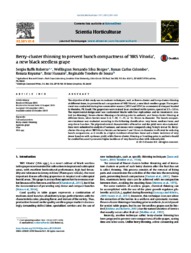Berry-cluster thinning to prevent bunch compactness of 'BRS Vitoria', a new black seedless grape.
Berry-cluster thinning to prevent bunch compactness of 'BRS Vitoria', a new black seedless grape.
Author(s): ROBERTO, S. R.; BORGES, W. F. S.; COLOMBO, R. C.; KOYAMA, R.; HUSSAIN, I.; SOUZA, R. T. de
Summary: The objective of this study was to evaluate techniques, such as flower-cluster and berry-cluster thinning at different times, to prevent bunch compactness of ?BRS Vitoria?, a new black seedless grape. The experiment was conducted during two consecutive seasons (2013 and 2014) in a commercial vineyard located in Marialva, PR, Brazil. The grapevines were trained in an overhead trellis system, spaced at 2.5 × 5.0 m. The experimental design used was randomized blocks with four replications and six treatments: control (no thinning); flower-cluster thinning or brushing prior to anthesis; and berry-cluster thinning at different times, when berries were 3?6, 7?10, 11?15, or 16?18 mm in diameter. The bunch compactness incidence was evaluated according to the following classification: very loose, medium loose, and very dense bunches. The physicochemical characteristics of bunches and the yield were also evaluated. Data were submitted to analysis of variance, and means were compared using Tukey?s test at 5%. Berrycluster thinning when ?BRS Vitoria? berries are between 7 and 18 mm in diameter is efficient for reducing bunch compactness, as it results in a higher incidence of medium loose and a lower incidence of very dense bunches with optimum yield, while flower-cluster thinning or brushing prior to anthesis should be avoided because it promotes higher incidence of very loose bunches with reduced yield.
Publication year: 2015
Types of publication: Journal article
Unit: Embrapa Grape & Wine
Keywords: Apirenic grape, Berry-cluster thinning, Cultural practices, Vine, Vitis spp
Observation
Some of Embrapa's publications are published as ePub files. To read them, use or download one of the following free software options to your computer or mobile device. Android: Google Play Books; IOS: iBooks; Windows and Linux: Calibre.
Access other publications
Access the Agricultural Research Database (BDPA) to consult Embrapa's full library collection and records.
Visit Embrapa Bookstore to purchase books and other publications sold by Embrapa.

